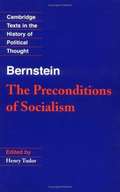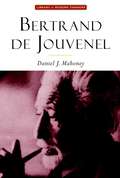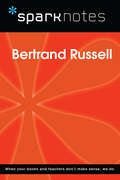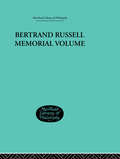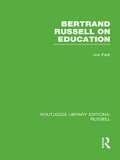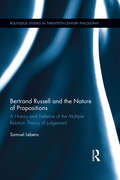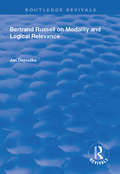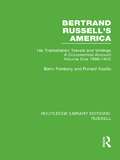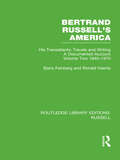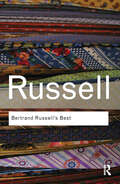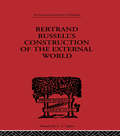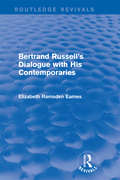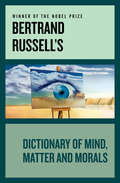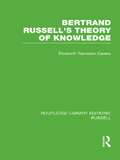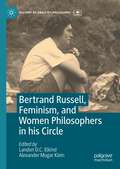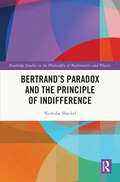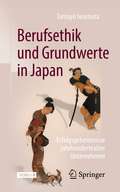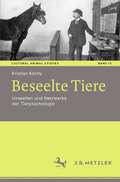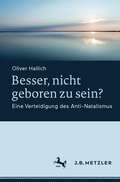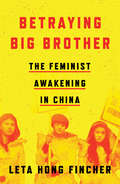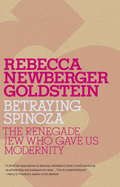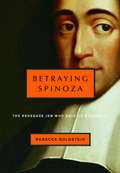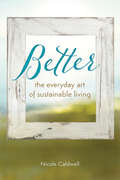- Table View
- List View
Bernstein: The Preconditions of Socialism
by Eduard Bernstein Henry TudorThis is the first complete new translation of Eduard Bernstein's (1850-1932) famous and influential work. It will provide students with an accurate and unabridged edition of the classic defense of democratic socialism and the first significant critique of revolutionary Marxism from within the socialist movement. First published in 1899, at the height of the Revisionist Debate, it argued that capitalism was not heading for the major crisis predicted by Marx, and that socialism could be achieved by piecemeal reform within a democratic constitutional framework. Bernstein's work is the focal point of one of the most important political debates of modern times, and crucial for the light it casts on "the crisis of Communism. "
Bertrand De Jouvenel: The Conservative Liberal and the Illusions of Modernity
by Daniel J. MahoneyIn his effort to detach the indispensable notion of the common good from its historical identification with the more closed, homogeneous, and static societies of the premodern past, the French political philosopher Bertrand de Jouvenel (1903-87) pointed the way towards a viable conservative liberalism. So argues Daniel J. Mahoney in this compelling introduction to the life and work of Jouvenel, one of twentieth-century France's most profound philosophers and political essayists. Although he vigorously defended the historical achievement of liberal society against its totalitarian critics, Jouvenel also challenged the modern conceit that man is an autonomous being beholden neither to the moral law nor to the humanizing inheritance of the past. Mahoney's study focuses on Jouvenel's three masterworks On Power (1945), Sovereignty (1955), and The Pure Theory of Politics (1963) and on his broader effort to defend civility and social friendship against rationalist individualism and its logical fruit, collectivist politics. Mahoney explores Jouvenel's affinities with and debts to Aristotle, Burke, Rousseau, and Tocqueville, and he contrasts Jouvenel's signal theoretical achievements with the twists and turns manifested in his (sometimes questionable) practical political engagements from the 1930s until his death. Mahoney's characteristically engaging appraisal of this important political philosopher, the fifth entry in the Library of Modern Thinkers series, is the first book on Jouvenel to appear in the English language.
Bertrand Russell (SparkNotes Philosophy Guide)
by SparkNotesBertrand Russell (SparkNotes Philosophy Guide) Making the reading experience fun! SparkNotes Philosophy Guides are one-stop guides to the great works of philosophy–masterpieces that stand at the foundations of Western thought. Inside each Philosophy Guide you&’ll find insightful overviews of great philosophical works of the Western world.
Bertrand Russell Memorial Volume
by Roberts, George WThis is Volume XXII of twenty-two in a collection on 20th Century Philosophy. Originally published in 1979, this volume attempts to assess some of the achievements of Bertrand Russell in philosophy, logic and mathematics, ethics and politics.
Bertrand Russell On Education: Studies In Educational Theory Of The John Dewey Society, No. 1 (Routledge Library Editions: Russell)
by Joe ParkAlthough scholars from many disciplines have turned their attention to Russell’s work and appraised its significance for a number of fields, and an extensive literature on him emerged, until this book, first published in 1963, no thorough study on Russell’s contribution to education – an area to which he devoted no small part of his energies – had yet appeared. The book is based on interviews with Russell as well as diligent research in his writings and the sources of his thought and will enlighten all who think seriously about education. It addresses specifically the usefulness of Russell’s thought for American educators, which was challenging as Russell dared to question traditional ends and means of education at the time.
Bertrand Russell and the Nature of Propositions: A History and Defence of the Multiple Relation Theory of Judgement (Routledge Studies in Twentieth-Century Philosophy)
by Samuel LebensBertrand Russell and the Nature of Propositions offers the first book-length defence of the Multiple Relation Theory of Judgement (MRTJ). Although the theory was much maligned by Wittgenstein and ultimately rejected by Russell himself, Lebens shows that it provides a rich and insightful way to understand the nature of propositional content. In Part I, Lebens charts the trajectory of Russell’s thought before he adopted the MRTJ. Part II reviews the historical story of the theory: What led Russell to deny the existence of propositions altogether? Why did the theory keep evolving throughout its short life? What role did G. F. Stout play in the evolution of the theory? What was Wittgenstein’s concern with the theory, and, if we can’t know what his concern was exactly, then what are the best contending hypotheses? And why did Russell give the theory up? In Part III, Lebens makes the case that Russell’s concerns with the theory weren’t worth its rejection. Moreover, he argues that the MRTJ does most of what we could want from an account of propositions at little philosophical cost. This book bridges the history of early analytic philosophy with work in contemporary philosophy of language. It advances a bold reading of the theory of descriptions and offers a new understanding of the role of Stout and the representation concern in the evolution of the MRTJ. It also makes a decisive contribution to philosophy of language by demonstrating the viability of a no-proposition theory of propositions.
Bertrand Russell on Modality and Logical Relevance (Routledge Revivals)
by Jan DejnožkaFirst published in 1999, this volume re-examines Bertrand Russell’s views on modal logic and logical relevance, arguing that Russell does in fact accommodate modality and modal logic. The author, Jan Dejnožka, draws together Russell’s comments and perspectives from throughout his canon in order to demonstrate a coherent view on logical modality and logical relevance. To achieve this, Dejnožka explores questions including whether Russell has a possible worlds logic, Rescher’s case against Russell, Russell’s three levels of modality and the motives and origins of Russell’s theory of modality.
Bertrand Russell's America: His Transatlantic Travels and Writings. Volume One 1896-1945 (Routledge Library Editions: Russell)
by Barry Feinberg Ronald KasrilsOriginally published in 1973, this volume documents Bertrand Russell’s travels in America covering the period 1896-1945. It is presented in two halves with the first a biographical account of Russell’s involvement with the United States, with special reference to the seven visits he made there during this time period. Throughout this section the most representative of Russell’s journalistic writings are highlighted and these are presented as full texts in the second half of the book. This collection is assembled to provide an understanding of Russell’s deep and many-sided involvement with the United States during his life. A documented account, it is supplemented with important letters, photographs and newspaper articles.
Bertrand Russell's America: His Transatlantic Travels and Writings. Volume Two 1945-1970 (Routledge Library Editions: Russell)
by Barry Feinberg Ronald KasrilsOriginally published in 1984, this volume documents Bertrand Russell’s travels in America covering the period 1945-1970. It is presented in two halves with the first a biographical account of Russell’s involvement with the United States, with special reference to the seven visits he made there during this time period. Throughout this section the most representative of Russell’s journalistic writings are highlighted and these are presented as full texts in the second half of the book. This collection is assembled to provide an understanding of Russell’s deep and many-sided involvement with the United States during his life. A documented account, it is supplemented with important letters, photographs and newspaper articles.
Bertrand Russell's Best (Routledge Classics Ser.)
by Bertrand RussellBertrand Russell is regarded as one of the twentieth century’s greatest minds. Well-known for his profound knowledge and controversial approach to myriad of different issues and subjects such as sex, marriage, religion, education and politics, his prolific works also exhibit great intellectual wit and humour. First published in 1958, Bertrand Russell’s Best is a delightfully funny and entertaining book, and a striking testament to the remarkable life work and wit of Bertrand Russell.
Bertrand Russell's Construction of the External World (International Library of Philosophy)
by Charles A. Fritz, Jr.,First published in 2000. Routledge is an imprint of Taylor & Francis, an informa company.
Bertrand Russell's Dialogue with His Contemporaries (Routledge Revivals)
by Elizabeth Ramsden EamesFirst published in 1989, this book considers Bertrand Russell’s philosophy through his correspondence with others. Indeed, his exchanges with his elders in philosophy, with his contemporaries, and with one of his most outstanding pupils are brought to life in this judicious exposition: meticulously documented before being judged with insight and sympathy, as well as impartiality. Elizabeth Ramsden Eames here explores the issues that emerged from Russell’s exchanges with certain other philosophers, and interprets the resulting reciprocal influences and reactions. The conversations presented cover subjects such as: the nature of relations; pluralism versus monism; the relation of the subject and object in knowledge; the analysis of experience; the definition of truth; the analysis of belief; and the theory of meaning. These have been in the forefront of philosophical discussion in our time, and Russell’s dialogue with his contemporaries promises to illumine them.
Bertrand Russell's Dictionary of Mind, Matter and Morals
by Bertrand RussellThis dictionary contains more than 1000 selections from over 100 of Russell&’s books and articles. It serves as an introduction to Russell&’s brilliance in analysis, argument, and exposition which develops a clear notion of his method of approach, his fundamental principles and many of his leading ideas. Found here are definitions and terms reflected in the topics of mind, matter and morals.
Bertrand Russell's Dictionary of Mind, Matter and Morals
by Bertrand RussellThis dictionary contains more than 1000 selections from over 100 of Russell&’s books and articles. It serves as an introduction to Russell&’s brilliance in analysis, argument, and exposition which develops a clear notion of his method of approach, his fundamental principles and many of his leading ideas. Found here are definitions and terms reflected in the topics of mind, matter and morals.
Bertrand Russell's Theory of Knowledge (Routledge Library Editions: Russell)
by Elizabeth Ramsden EamesWhen future generations come to analyze and survey twentieth-century philosophy as a whole, Bertrand Russell’s logic and theory of knowledge is assured a place of prime importance. Yet until this book was first published in 1969 no comprehensive treatment of his epistemology had appeared. Commentators on twentieth-century philosophy at the time assumed that Russell’s important contributions to the theory of knowledge were made before 1921. This book challenges that assumption and draws attention to features of Russell’s later work which were overlooked. The analysis starts with Russell’s earliest views and moves from book to book and article to article through his enormous span of writing on the problems and theory of knowledge. The changes in ideas as he developed the theory are traced, and the study culminates in a statement of his latest views. His work is seen in a continuity in which the changes were part of the development of his mature thought, and the total evaluation and interpretation clarify many of the common misunderstandings of his philosophy. This is naturally of interest to all philosophers, and for students this is the answer to inevitable questions on the nature of Russell’s ideas and their evolution.
Bertrand Russell, Feminism, and Women Philosophers in his Circle (History of Analytic Philosophy)
by Landon D. C. Elkind Alexander Mugar KleinThis book examines Bertrand Russell’s complicated relationships to the women around him, and to feminism more generally. The essays in this volume offer scholarly reassessments of these relationships and their import for the history of feminism and of analytic philosophy.Russell is a founder of analytic philosophy. He has also been called a feminist due to his public, decades-long advocacy for women’s rights and equality of the sexes. But his private behavior towards wives and sexual partners, and his apparently dismissive (occasionally public) responses to some women philosophers, raises the question of what sort of feminist (or chauvinist) Russell actually was.Focusing on women in Russell’s circle of acquaintance, including feminist activists and his philosophical interlocutors, this book casts new light on a timeless thinker’s feminism and the women who played critical roles in the making of analytic philosophy.
Bertrand’s Paradox and the Principle of Indifference (Routledge Studies in the Philosophy of Mathematics and Physics)
by Nicholas ShackelEvents between which we have no epistemic reason to discriminate have equal epistemic probabilities. Bertrand’s chord paradox, however, appears to show this to be false, and thereby poses a general threat to probabilities for continuum sized state spaces. Articulating the nature of such spaces involves some deep mathematics and that is perhaps why the recent literature on Bertrand’s Paradox has been almost entirely from mathematicians and physicists, who have often deployed elegant mathematics of considerable sophistication. At the same time, the philosophy of probability has been left out. In particular, left out entirely are the philosophical ground of the principle of indifference, the nature of the principle itself, the stringent constraint this places on the mathematical representation of the principle needed for its application to continuum sized event spaces, and what these entail for rigour in developing the paradox itself. This book puts the philosophy and its entailments back in and in so doing casts a new light on the paradox, giving original analyses of the paradox, its possible solutions, the source of the paradox, the philosophical errors we make in attempting to solve it and what the paradox proves for the philosophy of probability. The book finishes with the author’s proposed solution—a solution in the spirit of Bertrand’s, indeed—in which an epistemic principle more general than the principle of indifference offers a principled restriction of the domain of the principle of indifference.Bertrand's Paradox and the Principle of Indifference will appeal to scholars and advanced students working in the philosophy of mathematics, epistemology, philosophy of science, probability theory and mathematical physics.
Berufsethik und Grundwerte in Japan: Erfolgsgeheimnisse jahrhundertealter Unternehmen
by Tamayo IwamuraDieses Buch untersucht an Fallbeispielen jahrhundertealter Familienbetriebe in Japan, welche Bedingungen und besonderen Grundwerte ihren betrieblichen Fortbestand fördern. Wenig überraschend finden sich diese goldenen Regeln und Maximen auch in der Arbeitskultur und Wertorientierung der führenden japanischen Großunternehmen wieder. Die Autorin beleuchtet die sozioökonomische Entwicklung im Zusammenhang mit der religiösen Tradition und bringt westlichen Lesern die oft als geheimnisvoll empfundene Kultur Japans nah. Über fundierte Kenntnisse der Grundwerte und sozioökonomischen Geschichte Japans hinaus vermittelt sie dem Leser ein echtes Verstehen japanischen Denkens und Handelns, das ihm im Umgang mit japanischen Gesprächspartnern und bei Besuchen im Land einen authentischen eigenen Handlungsspielraum bietet. Aufgrund der Corona-Pandemie befinden sich weltweit viele Betriebe in der Existenzkrise. Gerade zu diesem Zeitpunkt können die Erfahrungen jahrhundertealter Betriebe in Japan, die stets erfolgreich um ihren Fortbestand erfolgreich gekämpft haben, gute Anregungen bieten.
Berufsorientierung Jugendlicher in Deutschland: Erwartungen, Sorgen und Bedarfe (SINUS-Studien)
by Marc Calmbach Christoph SchleerWie gut sehen sich Jugendliche auf die berufliche Zukunft vorbereitet? Welche Sorgen machen sie sich? Welche Vorstellungen haben Jugendliche über die Arbeitswelt? Welche Erwartungen richten sie an Beruf und Unternehmen? Wie informieren sie sich über berufliche Optionen und wo haben sie noch Unterstützungsbedarf? Diesen und weiteren Fragen ist das SINUS-Institut mit einer repräsentativen Studie auf den Grund gegangen.Ein zentraler Befund ist, dass die Berufsentscheidung weniger durch „externe“ Faktoren erschwert wird (Noten-Defizite, Druck der Eltern, fehlende Unterstützung), sondern primär auf persönliche Unsicherheiten zurückzuführen ist. Zugespitzt formuliert beschäftigt die Jugendlichen vor allem die folgende Frage: Was will und kann ich eigentlich, und zu welchen Berufen passt das?Auf Basis der Studienergebnisse werden Schlussfolgerungen gezogen und Handlungsempfehlungen formuliert.
Beseelte Tiere: Umwelten und Netzwerke der Tierpsychologie (Cultural Animal Studies #13)
by Kristian KöchyDie Tierpsychologie ist zu Beginn des 20. Jahrhunderts eine prominente Forschungsrichtung zwischen Biologie, Psychologie und Philosophie. Sie fragt nach psychischen Vermögen von Tieren. In essayhaften Studien zu namhaften Protagonisten werden im Buch Forschungskontexte der Tierpsychologie vorgestellt. Die ausgewählten Positionen verstehen menschliche Wahrnehmung ebenso gestalthaft wie die Forschungsgegenstände, die Tiere in ihren Umwelten. Das Buch untersucht Beziehungen von Philosophie und Wissenschaft, skizziert aber zudem eine Philosophie der Tierforschung, die die Interaktion von menschlichen und tierlichen Subjekten anerkennt.
Besser, nicht geboren zu sein?: Eine Verteidigung des Anti-Natalismus
by Oliver HallichIn der zeitgenössischen Reproduktionsethik werden intensiv moralische Probleme von Fortpflanzungstechniken wie Leihmutterschaft oder Gametenspende diskutiert. Erstaunlicherweise wird aber die fundamentale reproduktionsethische Frage, ob wir uns fortpflanzen sollten, kaum thematisiert. Auch Ethiken der Elternschaft erörtern zwar normative Probleme des Eltern-Kind-Verhältnisses und fragen nach der Grundlage parentaler Pflichten, äußern sich aber meist nicht zu der Frage, ob wir Eltern werden sollten. Der Anti-Natalismus, als dessen wichtigster zeitgenössischer Vertreter David Benatar gilt, widmet sich dieser zentralen Frage. Anti-Natalisten plädieren dafür, die Frage, ob wir uns fortpflanzen sollten, mit „Nein“ zu beantworten. In der vorliegenden Abhandlung wird nach der Tragfähigkeit anti-natalistischer Argumente gefragt; es wird zwischen verschiedenen Formen des Anti-Natalismus differenziert und dargelegt, in welcher Form sich ein Anti-Natalismus verteidigen lässt. Es wird deutlich, dass sich zwar keine Pflicht, sich nicht fortzupflanzen, begründen lässt, der Anti-Natalismus sich aber in einer bestimmten Form als kritikresistent erweist und zeigen kann, dass und warum es auch unter günstigen Umständen moralisch problematisch ist, Kinder in die Welt zu setzen.
Betraying Big Brother: The Feminist Awakening in China
by Leta Hong FincherA feminist movement clashing with China’s authoritarian government <P><P>On the eve of International Women’s Day in 2015, the Chinese government arrested five feminist activists and jailed them for thirty-seven days. The Feminist Five became a global cause célèbre, with Hillary Clinton speaking out on their behalf and activists inundating social media with #FreetheFive messages. But the Five are only symbols of a much larger feminist movement of civil rights lawyers, labor activists, performance artists, and online warriors prompting an unprecedented awakening among China’s educated, urban women. In Betraying Big Brother, journalist and scholar Leta Hong Fincher argues that the popular, broad-based movement poses the greatest challenge to China’s authoritarian regime today. <P><P>Through interviews with the Feminist Five and other leading Chinese activists, Hong Fincher illuminates both the difficulties they face and their “joy of betraying Big Brother,” as one of the Feminist Five wrote of the defiance she felt during her detention. Tracing the rise of a new feminist consciousness now finding expression through the #MeToo movement, and describing how the Communist regime has suppressed the history of its own feminist struggles, Betraying Big Brother is a story of how the movement against patriarchy could reconfigure China and the world.
Betraying Spinoza: The Renegade Jew Who Gave Us Modernity
by Rebecca GoldsteinIn 1656, Amsterdam's Jewish community excommunicated Baruch Spinoza, and, at the age of twenty-three, he became the most famous heretic in Judaism. He was already germinating a secularist challenge to religion that would be as radical as it was original. He went on to produce one of the most ambitious systems in the history of Western philosophy, so ahead of its time that scientists today, from string theorists to neurobiologists, count themselves among Spinoza's progeny. In Betraying Spinoza,Rebecca Goldstein sets out to rediscover the flesh-and-blood man often hidden beneath the veneer of rigorous rationality, and to crack the mystery of the breach between the philosopher and his Jewish past. Goldstein argues that the trauma of the Inquisition's persecution of its forced Jewish converts plays itself out in Spinoza's philosophy. The excommunicated Spinoza, no less than his excommunicators, was responding to Europe's first experiment with racial anti-Semitism. Here is a Spinoza both hauntingly emblematic and deeply human, both heretic and hero--a surprisingly contemporary figure ripe for our own uncertain age.
Betraying Spinoza: The Renegade Jew Who Gave Us Modernity
by Rebecca GoldsteinIn 1656, Amsterdam's Jewish community excommunicated Baruch Spinoza, and, at the age of twenty-three, he became the most famous heretic in Judaism. He was already germinating a secularist challenge to religion that would be as radical as it was original. He went on to produce one of the most ambitious systems in the history of Western philosophy, so ahead of its time that scientists today, from string theorists to neurobiologists, count themselves among Spinoza's progeny. In Betraying Spinoza, Rebecca Goldstein sets out to rediscover the flesh-and-blood man often hidden beneath the veneer of rigorous rationality, and to crack the mystery of the breach between the philosopher and his Jewish past. Goldstein argues that the trauma of the Inquisition's persecution of its forced Jewish converts plays itself out in Spinoza's philosophy. The excommunicated Spinoza, no less than his excommunicators, was responding to Europe's first experiment with racial anti-Semitism. Here is a Spinoza both hauntingly emblematic and deeply human, both heretic and hero--a surprisingly contemporary figure ripe for our own uncertain age.
Better
by Nicole CaldwellIntellectual arguments alone will not sway the dominant paradigm; to be motivated to create change, people must be moved. Art has the power to inform, influence, and inspire. The creative impulse can, quite literally, change the world.Better explores the intersection of sustainability and art, showing how each of us can reinvent our lives as our greatest artistic achievement. Presented in the context of the unique story of Better Farm, a blueprint for environmentally conscious living originally established as an intentional community, this unusual guide blends theory with practical, hands-on, DIY ideas to incite your own creative adventures, including: Upcycling trash into treasure Turning your fish tank into a garden Making your yard or balcony a work of artBetter is a concrete application of the Better Theory, which views every experience--good or bad--as an opportunity for exponential personal growth. Packed with life lessons and tips for making any lifestyle more sustainable, while drawing on everyone's inherent creativity, this unique book provides the inspiration to live more simply, take more chances, and engage more with the natural world. A must-read for anyone who questions the purpose of the daily grind or grapples with the need for more meaning in his or her life.Nicole Caldwell is the co-founder of Better Farm, a sixty-five-acre sustainability campus, organic farm, and artists' colony serving as a blueprint for environmentally conscious living. Her writings have been featured in Mother Earth News, Reader's Digest, and Time Out New York, among others.
